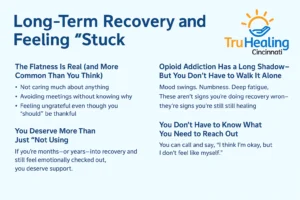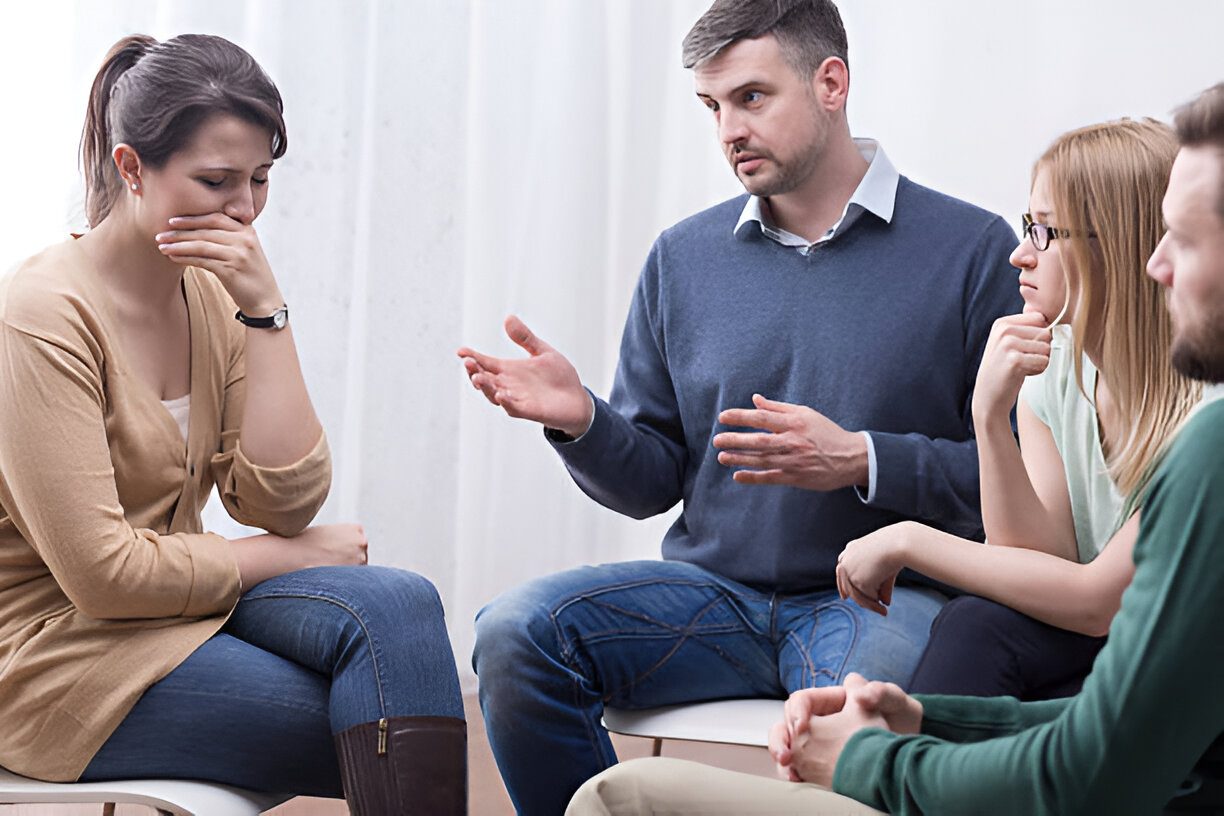It’s been months. Maybe years.
You’re clean. People say you “made it.” You’ve rebuilt your life on paper. But inside, something feels hollow.
You’re not in crisis. You’re not using. But you’re not thriving either.
If that feels familiar, you’re not broken—and you’re not alone.
At TruHealing Cincinnati, we work with many alumni in long-term recovery from opioid addiction who quietly wonder why things still feel off. This blog is for you. For the person who made it through the storm but now sits in the stillness wondering, “Is this all there is?”
Here’s the truth: Staying connected to your treatment center isn’t a weakness. It’s not a step backward. It’s a lifeline—especially when the outside looks okay, but the inside feels disconnected.
The Flatness Is Real (and More Common Than You Think)
The early days of recovery from opioid addiction are intense—gritty, raw, full of urgency. You show up because your life depends on it. You cry in group. You celebrate 30 days. You feel your heartbeat in every choice you make.
But eventually, the noise quiets. The structure loosens. You stop counting days because you stopped needing to—but with that freedom comes something else: emotional distance.
And it doesn’t always come with warning signs. Sometimes it just feels like:
- Not caring much about anything
- Avoiding meetings without knowing why
- Feeling ungrateful even though you “should” be thankful
- Wondering if you’re allowed to say out loud that things feel dull
This stage is common in long-term opioid addiction recovery. But that doesn’t make it easy. And it doesn’t mean you have to white-knuckle your way through it alone.
You Deserve More Than Just “Not Using”
Let’s say this plainly: Abstinence is not the finish line.
You didn’t go through treatment just to survive. You went through it to feel like yourself again. To feel connection, purpose, movement.
If you’re months—or years—into recovery and still feel emotionally checked out, you deserve more than congratulations. You deserve support.
Reconnecting with your treatment center can reignite parts of you that got lost in the routine of recovery. It doesn’t mean starting over. It means continuing forward—with more honesty, more depth, and more help than you think you’re allowed to ask for.
Treatment Centers Aren’t Just for Day-One You
Your treatment center isn’t just a place where you detoxed or processed trauma. It’s where you reclaimed your life. Where people saw you at your most vulnerable—and still believed in you.
That history matters.
Because when long-term alumni come back, it’s not to redo the past. It’s to re-anchor themselves in something true. Something that doesn’t expect them to perform strength or pretend everything’s okay.
We’ve seen you struggle. We’ve seen you soften. We’ve seen you heal.
And we’re still here.

Opioid Addiction Has a Long Shadow—But You Don’t Have to Walk It Alone
Even after the physical cravings fade, opioid addiction can leave behind emotional debris.
Mood swings. Numbness. Deep fatigue. Grief for the time lost. Fear that one bad day will spiral everything.
These aren’t signs that you’re doing recovery wrong. They’re signs that you’re still healing.
And healing—real healing—takes time, space, and community.
Reconnecting with your treatment center gives you access to:
- Clinicians who understand long-term recovery challenges
- Alumni programming that honors where you are now
- Space to speak freely, without having to explain or defend your feelings
You don’t need a relapse to justify needing support. Feeling emotionally stuck is enough.
You Don’t Have to Know What You Need to Reach Out
One of the biggest barriers we hear from alumni is:
“I don’t even know what to ask for.”
Here’s the truth: You don’t have to.
You can call and say:
- “I think I’m okay, but I don’t feel like myself.”
- “I’ve been avoiding people, and I don’t know why.”
- “I miss feeling connected to something.”
- “Can I just talk to someone for a bit?”
That’s enough. You’re enough.
We don’t expect perfection. We don’t need a plan. We’ll figure it out with you. Because staying connected doesn’t start with clarity. It starts with courage.
Local Support Helps You Stay Grounded
If you’re in the region, reconnecting doesn’t have to be complicated. Whether you’re based in Lexington, Lawrenceburg, or Louisville, TruHealing Cincinnati offers local alumni support that’s designed to be approachable, human, and helpful—not performative.
Options include:
- Peer-led alumni groups
- One-on-one clinical check-ins
- Mindfulness or skills refreshers
- Help navigating new stressors, grief, or life shifts
- A place to be emotionally honest without judgment
These aren’t just services. They’re reminders that you’re still seen, still supported, and still part of something that matters.
Recovery Is a Living Story—Not a Closed Chapter
There is no “after” in recovery. Only next.
If you’re still here—breathing, trying, wondering—you’re still in it. That’s not failure. That’s what makes your story worth telling.
Staying connected to your treatment center keeps that story alive. It keeps you from drifting so far into independence that you forget how much help you’re allowed to have.
And it reminds you, again and again, that healing isn’t linear. It’s relational. It’s ongoing. And it’s yours.
FAQs: Staying Connected in Long-Term Opioid Addiction Recovery
Do I need to be in crisis to reach out again?
Not at all. Many long-term alumni return simply because they feel flat, distant, or uncertain. You’re welcome to reconnect even if you’re still clean and functioning.
What kind of support can I expect as an alum?
Support varies based on your needs and preferences. It might include check-ins with a therapist, alumni groups, peer events, or just a space to talk through your current emotional state.
I moved away—can I still reconnect?
Yes. Whether you’re in Lexington, Lawrenceburg, or Louisville, we can help bridge you to local support or reconnect you virtually to our team.
Will I be judged for not staying in touch?
No. Life happens. We understand that people drift. The door stays open, and there is no shame in walking back through it.
What if I don’t know what I need, but something feels off?
That’s actually one of the best reasons to reach out. We can talk through what’s going on and help you figure out what kind of support makes sense for where you are now.
Still feel like something’s missing in recovery?
Call (888) 643-9118 or visit our Opioid Addiction Treatment page to reconnect with care that knows where you’ve been—and still believes in where you’re going.

